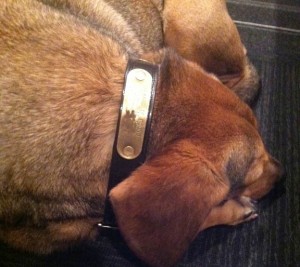Georgia sometimes snores. It’s generally cute and relatively quiet, but occasionally she lets out a loud snort. Luckily she doesn’t sleep in the bed with us, or I’d be awake all night. For those dog owners whose dogs snore and they share a bed, I can only imagine what that can do to your night’s sleep.
Why does my dog snore?
So why does a dog snore? Just like in humans, an obstructed air passage may cause a dog to snore. This can be caused by several factors, and depends on your dog. Getting your dog checked out by a vet can help you determine the cause and whether it is something to worry about or not.
Physical characteristics of the dog breed
Certain breeds of dogs are prone to snoring and breathing difficulties due to the shape of their skull and muzzle. These dogs suffer more in humid, hot conditions or when exercising. Breeds that are commonly affected include Bulldogs, Pugs, Pekingese, Shih Tzu, Boston Terriers, and others. Our local college mascot is the Bulldog, and you can definitely hear these dogs snort and struggle when they are breathing hard. These congenital conditions and their treatment are discussed on Webmd.com.
Additional weight (obesity or overweight dogs)
Surprisingly, the same types of things that can cause humans to snore also affect dogs. Being overweight makes a dog prone to snoring. Since Georgia is more than a few pounds overweight, I suspect this is what causes her to snore. We’ll have to work on that one once the temperatures outside get below the high 90’s and low 100’s.
Allergies
Allergies can also make a dog snore. If you know what your dog is allergic to, try to remove that source from his bedding and the areas that he spends the most time in. If your dog is like Belle, and is allergic to pine and grass, and various outdoor things, maybe an allergy pill is the way to go. Check with your veterinarian for advice on this matter.
Air-borne irritants
Airborne pollutants like smog, household cleaners, and cigarette smoke can also affect dogs. Try taking these out of the picture (or doing your best to avoid them) and see if your dog’s snoring lessens.
Sleeping positions
Sleeping position is something known to affect snoring in humans, and surprisingly, it may also affect a dog. Watch your dog to see which positions, if any, cause more or less snoring. If you can find a dog bed that promotes better sleeping positions, than that might be a solution. Now getting him to use that bed….that’s another issue entirely.
Colds or illness
Even colds can affect a dog’s snoring. If you notice your dog snoring along with other symptoms of a cold or virus or if he suddenly starts snoring when he has never done so before, consider a visit to your vet to find out the underlying cause and for some remedies.
Other obstructions
An obstruction may also be causing the snoring – either something that got stuck in the dog’s throat such as a toy, or an abnormal growth. If you suspect this is an issue (maybe a favorite toy has gone missing?) then you should definitely see your veterinarian.
When to see a vet
You know your dog best, and if the snoring seems to be causing your dog problems, it is time to take him to the veterinarian for a check-up, especially if the snoring is accompanied by difficulty breathing when awake.
